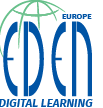
- This event has passed.
2010 Valencia
Taken by Storm
The volume of information we get is enormous and there is a revolutionary change in the ways we use media. New social media culture is extending human capacity, reshaping identity and community. The awareness of the many forms of digital media is increasing and of the skills that allow better intellectual and emotional understanding.
The diffusion of digital creative content and the multiplication of online and mobile platforms, the changeable, participatory, rapidly re-created information generate unprecedented opportunities for the world of learning. Teachers and learners abilities to make informed and diversified choices for media now make up a significant part of their skills portfolio.
The many economic, social and technology drivers are changing the nature and methods of education and training. In particular, the informal learning field is being transformed and re-positioned. All this represents huge challenges for the professional development of teachers, tutors and instructors. A quest for new structural and institutional models is emerging within the learning society.
In Europe, content industries create added value by exploiting and networking European cultural diversity, with innovation being part of the Lisbon strategy beyond 2010. The EU i2010 initiative aims to boost competitiveness in the ICT sector and create a single European information space.
New Criteria for New Media in Learning
The opportunity offered by digital media and virtual reality leads to the development of new organic learning environments. A major challenge is how to turn these environments into instrumental knowledge. New elements include development of mobile, ubiquitous and contextual computing, microlearning, functional networking, direct access to databases, with which to build up integrated knowledge bases. Within the new distribution channels, trends in the media habits of learners show significant changes.
There are quite a few related questions to answer:
- Where do new media take us as educators?
- What in the end is their suitability for education?
- For teachers and learners, what is the value of being active in new media?
- Having a presence on Twitter?
- Being an active blogger?
- What is the validity of knowledge in Web 2.0
- How can we measure recognition and achievement?
- How do media portray the changing open and distance learning practice?
- How can we control the potential of media to ensure that they work for all?
- How all is this affecting the modes of knowledge organisation?
- With the convergence of media, how are the major issues of learning mirrored in the traditional media channels, in TV, newspapers and journals?
Openness Emerges
Organically linked to these developments are the further changes in form and function, representing the greater and greater potential of open collaboration and information sharing. Globalization, information technology and the flow of information are transforming our economies and communities. The evolving new openness is unlocking the potential effectiveness in implementing open ICT ecosystems and enabling innovation and growth.
Collaborative creativity, connectivity, access and transparency, are revolutionizing how we communicate, learn, connect and compete. Openness reshapes ICT ecosystems, and makes it possible to rewrite business models and deliver customized services to citizens. Increasing these capacities helps to create flexible, service-oriented ICT applications in the world of learning. This has also profound implications for the publishing industry, leading to a kind of new knowledge and media economy.
